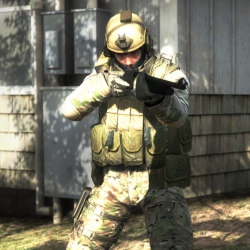
Counter-Strike: Global Offensive won the award for “eSports Game of the Year” at The 2015 Game Awards.
The Washington Gaming Commission has ordered Valve to stop the gambling activity on Counter-Strike: Global Offensive skins. For months, Valve Corp. has tried to distance itself from third-party websites which allows skin gambling, but that is not enough for the gambling commission.
Valve has been ordered to stop allowing the transfer of gun skins through Steam. Valve has until October 14 to prove to the Washington Gaming Commission it is in compliance with the law or it will face “additional civil or criminal action“.
Commissioner Chris Stearns called upon Valve to rein-in the “large, unregulated black market” which trades in skins.
Counter-Strike: Global Offensive Gaming Community
Counter-Strike: Global Offensive is a popular online video game on the Valve gaming community. CS:GO is a first-person shooter game based on tactical modern warfare. The game pits two teams against each other, who play as terrorist and a counter-terrorist units. CSGO is highly competitive, because it combines objective-based gaming with the ability to eliminate the other team.
Virtual weapons in the game are called “Skins”. These skins can be encountered during the game, but they also can be purchased through the Valve site.
Some skins are so common they are virtually worthless. Others are rare, so they cost significant money to buy. Because these video game weapons have real world value among the gaming community, they are gambled on third-party sites. Wagers are a simple 50/50 proposition, the equivalent of a coin toss.
Valve’s Role in the Skin Trade
For months if not years, Valve ignored the proliferation of skin-gambling on these sites. But a variety of events in the past year has caused Valve to react to the skin sites, for the sake of public opinion and legal jeopardy. One event is a class-action lawsuit against Valve, which claims the eSports company allowed underage gamblers to partake in the gambling.
An even more immediate reason Valve began to distance from the skin gambling industry was a scandal involving one of those sites and YouTube. Trevor “TmarTn” Martin and Tom “Syndicate” Cassel each ran successful YouTube channels which touted a particular skin-gambling site, CS:GO LOTTO.
CSGO Lotto Scandal
The two men pretended to be happy customers of the site, but in truth were owners or had a financial stake in CSGO Lotto. That not only is a violation of YouTube’s terms and conditions, but it also violates laws applied by the Federal Trade Commission. Trevor Martin and Tom Cassell face serious legal jeopardy for their YouTube careers.
When the scandal came to light, Valve’s hands-off approach was noted by authorities, parents groups, and the player community. Any charges in the case are especially serious, because children as young as 13 have been known to gamble on the skin sites. Soliciting underage gambling is a felony offense in the United States, as it is in many countries worldwide.
CSGO Lounge’s $1 Billion Trade
By comparison, CSGO Lotto was a small-time player compared to other skin sites. CSGO Lounge, the most successful of the third-party sites, conducted $1 billion in business last year. The black market is a huge black market.
Valve’s Efforts to Stem the Trade
For its part, Valve claims it has tried to stem the black market trade. It has sent 40 cease-and-desist notices to different website operators. The class-action lawsuit was tossed-out by a federal judge in Los Angeles on October 4, who determined Valve was not responsible for third-party operators.
Whether the same arguments work against the Washington Gaming Commission is another matter. For that matter, it is uncertain what actions the gaming commission would take against Valve, if it deemed that the gaming site was not taking good-faith measures to stop skin gambling.
Engadget speculated the commission might restrict skins, though it admitted there was not sign the WGC would ban skins altogether in the state.
